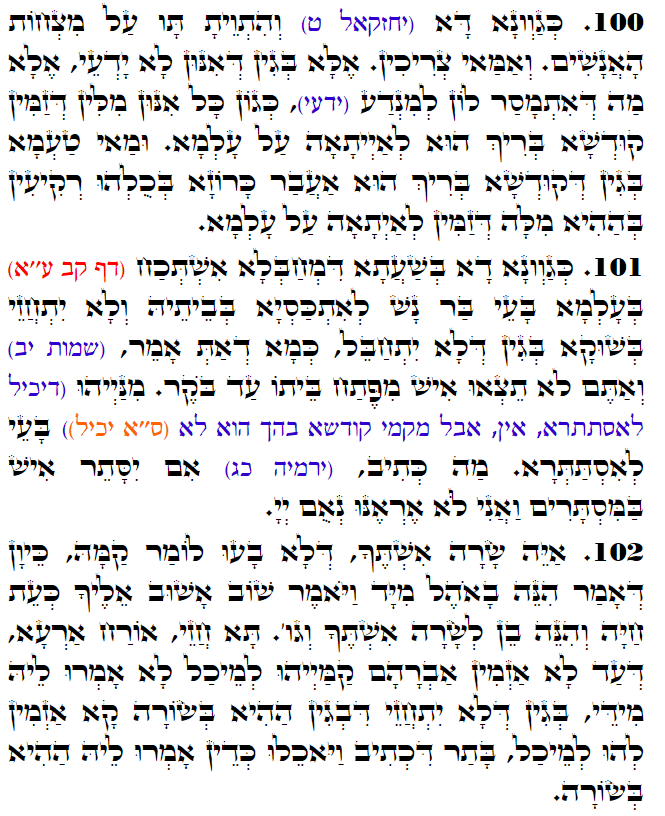Daily Zohar # 3190 – Vayera – Put a mark on the foreheads

.
Hebrew translation:
101. כְּגוֹן זֶה בְּשָׁעָה שֶׁהַמַּשְׁחִית נִמְצָא בָעוֹלָם, צָרִיךְ בֶּן אָדָם לְהִסְתַּתֵּר בְּבֵיתוֹ וְלֹא יִהְיֶה נִרְאֶה בַּשּׁוּק כְּדֵי שֶׁלֹּא יֻשְׁחַת, כְּמוֹ שֶׁנֶּאֱמַר (שמות יב) וְאַתֶּם לֹא תֵצְאוּ אִישׁ מִפֶּתַח בֵּיתוֹ עַד בֹּקֶר. מֵאֵלּוּ שֶׁיָּכוֹל לְהִסְתַּתֵּר כֵּן, אֲבָל מִלִּפְנֵי הַקָּבָּ”ה לֹא [ס”א יָכוֹל] צָרִיךְ לְהִסְתַּתֵּר. מַה כָּתוּב? (ירמיה כג) אִם יִסָּתֵר אִישׁ בַּמִּסְתָּרִים וַאֲנִי לֹא אֶרְאֶנּוּ נְאֻם ה’.
102. אַיֵּה שָׂרָה אִשְׁתְּךָ, שֶׁלֹּא רָצוּ לוֹמַר לְפָנֶיהָ. כֵּיוָן שֶׁאָמַר הִנֵּה בָאֹהֶל, מִיָּד – וַיֹּאמֶר שׁוֹב אָשׁוּב אֵלֶיךָ כָּעֵת חַיָּה וְהִנֵּה בֵן לְשָׂרָה אִשְׁתֶּךָ וְגוֹ’ בֹּא רְאֵה דֶּרֶךְ אֶרֶץ, שֶׁעַד שֶׁלֹּא הִזְמִין אַבְרָהָם לִפְנֵיהֶם לֶאֱכֹל, לֹא אָמְרוּ לוֹ דָּבָר, כְּדֵי שֶׁלֹּא יֵרָאֶה שֶׁמִּשּׁוּם אוֹתָהּ בְּשׂוֹרָה הִזְמִין אוֹתָם לֶאֱכֹל. אַחַר שֶׁכָּתוּב וַיֹּאכְלוּ, אָז אָמְרוּ לוֹ אוֹתָהּ בְּשׂוֹרָה.
.
Zohar Vayera
#100
Ezekiel 9:4
“וַיֹּאמֶר יְהוָה אֵלָיו עֲבֹר בְּתוֹךְ הָעִיר בְּתוֹךְ יְרוּשָׁלָים וְהִתְוִיתָ תָּו עַל מִצְחוֹת הָאֲנָשִׁים הַנֶּאֱנָחִים וְהַנֶּאֱנָקִים עַל כָּל הַתּוֹעֵבוֹת הַנַּעֲשׂוֹת בְּתוֹכָהּ.”
“And YHVH said to him, “Go through the midst of the city, even through the midst of Jerusalem, and put a mark on the foreheads of the men who sigh and groan over all the abominations which are being committed in its midst.”
God sent the angel that advocates for the righteous people in Jerusalem to put a mark on their foreheads to separate them from the wicked.
The Angels know only what they need to be done by them. The Holy One Blessed be He announces the future actions in all heavens and the angels know what will be done.
When they this mark on the forehead of a person they know that he is protected and keep him from harm.
#101
When the angel that executes judgment is in the world, we should stay in a protected home away from public places.
Exodus 12:22
“וּלְקַחְתֶּם אֲגֻדַּת אֵזוֹב וּטְבַלְתֶּם בַּדָּם אֲשֶׁר בַּסַּף וְהִגַּעְתֶּם אֶל הַמַּשְׁקוֹף וְאֶל שְׁתֵּי הַמְּזוּזֹת מִן הַדָּם אֲשֶׁר בַּסָּף וְאַתֶּם לֹא תֵצְאוּ אִישׁ מִפֶּתַח בֵּיתוֹ עַד בֹּקֶר.”
“You shall take a bunch of hyssops and dip it in the blood which is in the basin and apply some of the blood that is in the basin to the lintel and the two doorposts, and none of you shall go outside the door of his house until morning.”
Before the killing of the firstborn God commanded the Israelites to mark their doorposts and stay at home all night so the energy of death won’t affect them.
We can hide from angels but not from God.
Jeremiah 23:24
“אִם יִסָּתֵר אִישׁ בַּמִּסְתָּרִים וַאֲנִי לֹא אֶרְאֶנּוּ נְאֻם יְהוָה הֲלוֹא אֶת הַשָּׁמַיִם וְאֶת הָאָרֶץ אֲנִי מָלֵא נְאֻם יְהוָה.”
“Can a man hid himself in hiding places, So I do not see him?” declares YHVH. “Do I not fill the heavens and the earth?” declares YHVH.”
#102
Abraham served the angels food and they didn’t want him to fear them if they reveal themselves immediately. They also allowed him to complete his act of hospitality, so it won’t be seen as if he invited them to eat because they gave him the message of having a son.
After they ate they asked him where Sarah is. After they heard that she’s in the tent, they didn’t go in to deliver the message personally but told it to Abraham outside.
Lesson;
Our home with the Mezuzah on the doorpost protects us from negative forces. The word Mezuzahs in the verse above ‘מְּזוּזֹת’ has the letters that form the words ‘זז מוות’ that means ‘remove death’. When we feel the negative energy in our environment we should find shelter in the words of the Zohar, Torah, Psalms to surround us with Light that keeps away the negative side.
It’s important to read and internalize this verse; Jeremiah 23:24 “Can a man hide himself in hiding places, So I do not see him?” declares YHVH. “Do I not fill the heavens and the earth?” declares YHVH”
The angels respected Abraham and protected his feelings. They don’t need or eat food, but they accepted it just to make him happy and earn the light of the Mitzvah.
We should be sensitive to others and allow them the freedom to do a Mitzvah even if we don’t benefit from it directly.
{||}

 Previous: Vayera
Previous: Vayera

